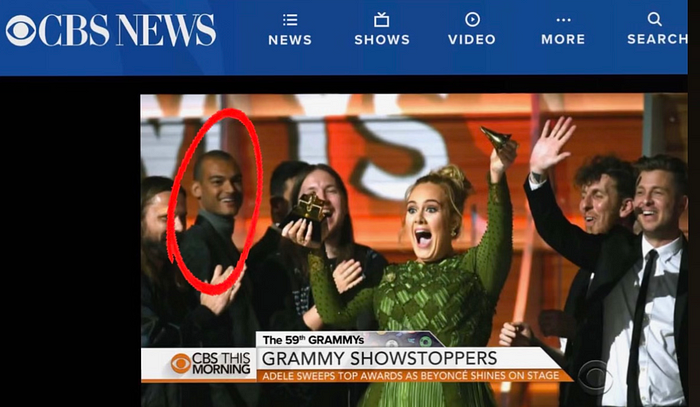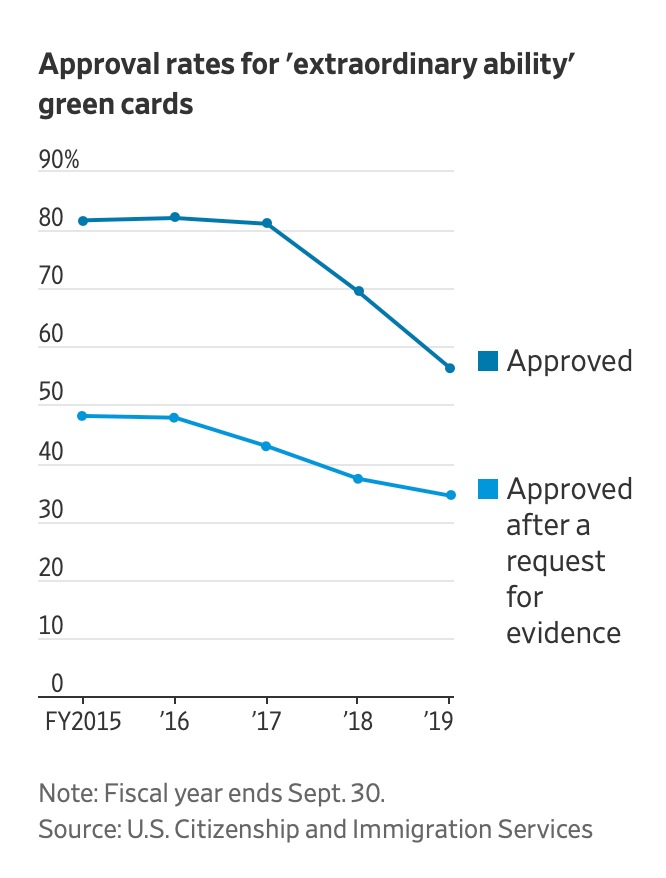British music producer Austen Jux-Chandler had been living and working in Los Angeles for several years on a temporary working visa called an “O-1.” Austen has worked with Ed Sheeran, Florence and the Machine, Lady Gaga, Paul Weller, A$AP Rocky, Plan B, John Legend, and The Weekend. In 2016 Austen won the “Album of the Year” Grammy Award for producing Adele’s “25.”

As the pandemic hit in 2020 Austen kept busy — and he is in very high demand. Something struck him and he decided he wanted to make the transition from his O-1 visa, which has a fixed end date, into a greencard, which is permanent. He put it this way,
“My life is here [in Los Angeles]. I want to open my own studio, and hire the musicians, and artists myself. I wanted to know my immigration was stable and long term.”
He reached out to me in the height of the lockdown last Spring. I’d done immigration work for some of Austen’s colleagues and I was already familiar with his work and great reputation. Although we couldn’t meet in person we reviewed his qualifications together and quickly identified Austen as a great greencard candidate.
There’s a special category of U.S. greencards given out to the best of the best. Technically referred to as an “I-140 EB-1A” petition, the U.S. allocates permanent residency status to “extraordinary” scientists, artists, educators, business people, or athletes who have “sustained national or international acclaim.”
The simplest way to show extraordinary ability in the arts is through “evidence of a one-time achievement, that is, a major, internationally recognized award” such as Nobel Prize, Oscar, or Grammy. Receipt of an award like this means the greencard should be granted per se and no further analysis or evidence is required.
Since most people haven’t won a Grammy, Nobel, etc., the way most people apply under this category is to show they match at least 3 of 10 “qualifying criteria.” So we adopted a “belt and suspenders” approach for Austen’s case — show he won the Grammy first, and second show that he matches at least 3 of the criteria. How embarrassing would it be for an immigration officer to second guess the merit of someone who has won an award like a Grammy — they would never do that, right? Who has that kind of Chutzpah?
We filed Austen’s case with the Nebraska Service Center of the U.S. Citizenship and Immigration Service (“USCIS”) over the Summer 2020. Why Nebraska? There’s only two immigration offices in the U.S. that process these applications: one in Nebraska and one in Texas; and you file in one office vs. the other depending on your residential address. Austen lives in California so we file in Nebraska.
But apparently in Nebraska a Grammy isn’t a Grammy, or at least it isn’t a Grammy when it matters for immigration.
In response to the case, USCIS issued a “Request for Evidence” in late January 2021. They stated, “the petitioner was nominated for Engineer/Mixer, Album of The Year, 2016 Grammy Awards. However, the record contains no evidence that the petitioner won this award. The record does not indicate that the petitioner was one of the named winners of the award.”
I was genuinely confused. Had USCIS overlooked the section, separately tabbed, in full color, about the Grammy win? I reached out to Congressman Jimmy Gomez, who represents Austen in California’s 34th Congressional District. “Can you reach out to USCIS and point out their error, overlooking the award,” I asked. Recall Congressman Gomez was busy at that moment contending with the antics of Marjorie Taylor Greene, but his staff was on top of it.
Congressman Gomez’s office was great — they reached out to top USCIS brass and quickly saw the issue and pressed USCIS to approve the case. “I did argue that winning a Grammy award should be sufficient evidence to grant the I-140,” they wrote.
USCIS doubled down and told us to respond to their RFE and that the RFE had not been issued in error.

We responded with full color photos and links to the grammy.com website as further proof of Austen’s win. USCIS denied the case on February 19, 2021. The totality of USCIS’ denial decision under the “major, internationally recognized prize or award” section is as follows:
“The evidence does not show that you received a major, internationally recognized prize or award. As a result, the evidence must demonstrate that you have fulfilled at least three of the 10 criteria listed in the regulations.”
No argument. No analysis. Barely an acknowledgement we had made the argument to begin with. However, under the section in the denial related to the ten qualifying criteria USCIS stated:
“[Y]ou have provided sufficient documentation to establish that you meet the following regulatory criterion:
Documentation of the alien’s receipt of lesser nationally or internationally recognized prizes or awards for excellence in the field of endeavor. 8 C.F.R. 204.5(h)(3)(i).
The record shows that you were one of the mixer/engineers for Adele’s Album of the Year at the 2016 Grammy Awards for which you received a Grammy statuette. This, however, is not a Grammy Award, but recognition that you and your group worked on an album that garnered a Grammy Award Album of the Year. Accordingly, your statuette does not qualify as a one-time achievement that is a major, internationally recognized award. This notwithstanding, we recognize this accomplishment as a lesser nationally or internationally recognized award for excellence in the field of endeavor.”
I had to read that a few times. “This … is not a Grammy Award … your statuette does not qualify.” I had flashbacks to a college English course in postmodern literature I’d took in 1998 or 1999. Alice in Wonderland growing up to adulthood and still talking to white rabbits in waistcoats. Discussing the meaning of “Jabberwocky.” Rene Magritte’s “The Treachery of Images” (or as I know it in my mind “This is Not a Pipe”)

I started thinking of the last four years of “alternative facts” and “truth isn’t truth.” Is it not a Grammy the same way Biden is not president? Is the actual Grammy for 2016 Album of the Year hiding along with those those 11,780 votes in Georgia? Does the immigration service really think that a Grammy award isn’t in fact a Grammy award? If USCIS gets to ignore and mischaracterize this kind of evidence, that is so clear and unambiguous, what’s to stop them when the facts are more subtle, where the evidence isn’t as obvious?
I snapped out of that quickly enough and called Austen with the bad news and my most American of recommendations, “lets sue the government.”
“Suing the government” conjures a lot of emotions in immigrant communities. Most of that is brought on by what they know of their home country government, and what they perceive from the U.S. government. The most common concern is that the government will retaliate. I get this concern even from Brits and Australians. Point taken, although I know of no instance of retaliation for suing the U.S. government.
The question we had is one of practicality. Will the bad USCIS decision be something a U.S. attorney wants to defend? U.S. attorneys are before the same judges day in and day out. Defending a bad agency decision burns credibility with the judge, and adds to an already jammed docket for the U.S. attorney. Then again, if you want to draw this fight out the U.S. attorney and Justice Department has resources at its disposal most Fortune 500 companies do not. There’s also the possibility the Judge ultimately decides against us, upholding a bad USCIS decision and giving greater latitude to USCIS to make more bad decisions in the future.
In this case, Austen and I felt we couldn’t let this bad decision stand and whatever risk was offset by our belief that we would ultimately prevail on these facts. To my relief he was on board!
We brought on board another litigator — Brian S. Green out of Littleton, Colorado. Brian was the point person at his firm for suing the government over delayed production of work permit cards, travel permits, and greencards. He knows the mechanics of the system like no one else I know.
We filed our lawsuit naming the USCIS Director, the Homeland Security Secretary, the Attorney General, and of course the Nebraska Service Center Director, on February 25, 2021. A lawsuit like this is made under the prosaicly-titled “Administrative Procedures Act.” Under the APA a person adversely affected by an agency action is entitled to judicial review — effectively the trial court acts as a court of appeal from the agency.
The court has broad authority to set aside any agency action that is “arbitrary, capricious, an abuse of discretion, or otherwise not in accordance with law.”
We argued, “Defendant USCIS failed to identify any facts supporting its conclusion that ‘[t]he evidence does not show that [Plaintiff] received a major, internationally recognized prize or award.’ USCIS offers no facts or analysis to contradict the plain language statements made by the Recording Academy that the petitioner-plaintiff won the Grammy award himself. In fact, in suggesting it has ‘sufficient documentation’ that Plaintiff’s Grammy award for ‘Album of the Year’ is a ‘lesser … prize or award for excellence’ USCIS would seem to reinvent what the Grammy award is — turning the highest honor into a lesser prize. This would be an absurd outcome, if USCIS were allowed to arbitrary decide who wins Grammy awards for purposes of the INA and implementing regulations.”
On March 9, 2021 USCIS emailed me their standard “approval” email — just 7 full working days since we filed. Case approved. No fanfare. A few hours later an assistant U.S. attorney sent Brian and me an anodyne email to let us know she’d been assigned the case, that the greencard had been approved, and to please dismiss the lawsuit. The bad decision wouldn’t be defended; we won.
Journalist Sarah Stillman of The New Yorker produced an epic accounting of the damage done over the Trump years to the lawful system of immigration in the United States. “The Damage” chronicles the small, unpublicized changes that made real differences in people’s lives in asylum cases:
“The Presidency of Donald Trump may be defined, in part, by his assaults on the immigration system, many of which are well known. … in the past several years, [human rights lawyer] Flamm and her colleagues at the Door have also found themselves pitted against an extensive, unpublicized bureaucratic effort to transform immigration through rule changes, adjustments to asylum officers’ guidelines, modifications to enforcement norms, and other measures.”
In the world of “extraordinary abiltiy” greencards, we measured a sharp decrease in the approval level over the past four years.

To date, no one has been able to account for the decrease in approval rates. There was no rule change during this timeframe. At least, there was no rule change that was announced publicly.
I am not the first immigration lawyer who notes that with Trump the chaos wasn’t a bug — it was a feature. I am happy for the outcome in Austen’s case. But Austen has resources, lawyers, and speaks English as his primary language. I worry about the unknown rules, chaotic implementation, and defiant USCIS officers still impacting unknown people who would have been able to avail themselves of U.S. immigration laws but for errors of the kind Austen faced, confronted, and ultimately prevailed against.
Joe Adams is an immigration lawyer focused on arts, entertainment, sports, and entrepreneurs. Twitter: @jaesqlaw
